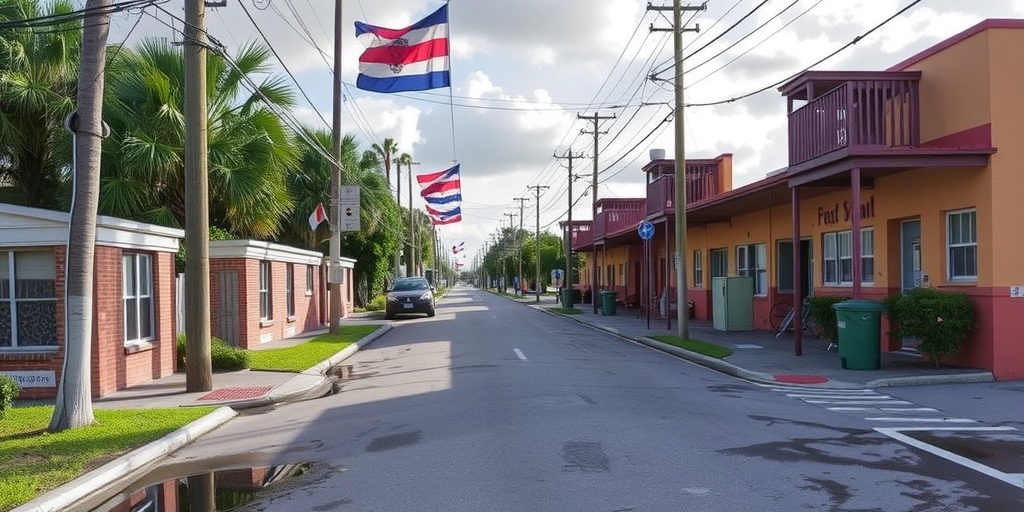Now Reading: Play on Segregation Struggles to Navigate Florida’s Fine Line
-
01
Play on Segregation Struggles to Navigate Florida’s Fine Line
Play on Segregation Struggles to Navigate Florida’s Fine Line

Unsung Heroes of the Civil Rights Movement: A Play Revives Florida’s Legacy
Tampa, Florida – Six and a half decades ago, a group of high school students attempted to order lunch at an F.W. Woolworth store in Tampa, only to find that the lunch counter was closed to them due to their race. Among them was Arthenia Joyner, now 82, who reflects on those pivotal moments of civil disobedience that went largely unnoticed in history. “The protests we staged aren’t well-known,” Joyner said, indicating a widespread lack of awareness about Florida’s role in the civil rights movement despite the significant consequences.
The students refused to leave Woolworth’s without being served, engaging in a form of peaceful protest that led to the desegregation of the lunch counters within months. Their actions, although they did not receive national attention like the Greensboro sit-ins or the Montgomery bus boycotts, played a crucial role in advancing civil rights in the region. “The sit-ins were the beginning of the end of segregation at stores in Tampa,” Joyner stated, highlighting the importance of collective action in achieving social justice.
In an effort to bring attention to these essential yet overlooked episodes of history, a new play titled “When the Righteous Triumph” has been staged at the Jaeb Theater, part of the David A. Straz Jr. Center for the Performing Arts in Tampa. The play dramatizes the protests from 1960 and aims to educate audiences about the contributions of Florida’s civil rights activists. The production debuted in 2023 and is now running for two consecutive weekends, targeting school audiences with nearly 40 local schools expected to attend.
As national discussions about arts and education become increasingly polarized, the timing of this play is particularly pertinent. “We are trying to navigate the current political landscape while promoting something so vital,” shared Karla Hartley, the producing artistic director at Stageworks Theater, where the play was initially performed. “It’s essential not to draw negative attention from state officials while providing this important narrative.”
The political climate in Florida under Governor Ron DeSantis has been contentious, with efforts to curb what he calls "woke" ideologies in education. DeSantis has enacted laws limiting discussions about race in school curricula and has previously vetoed $32 million in arts grants approved by state lawmakers, raising concerns about the financial viability of the arts in the region. “The landscape is challenging, but we must persevere to bring these stories to light,” Hartley emphasized.
Former U.S. Representative Jim Davis, who is deeply connected to Tampa’s civil rights history—being the grandson of Cody Fowler, an attorney featured in the play—has taken the initiative to revive “When the Righteous Triumph” to ensure wider accessibility. “We want students to understand why certain streets are named after historical figures,” Davis noted. He spearheaded fundraising efforts that successfully collected around $500,000 for production costs, making it financially viable to bring the show back while producing a television adaptation and documentary.
Davis recognizes the power of community activism in driving change: “Real impact will occur at the local level. Communities have always taken charge, and history shows us that.” As participants in the original protests, the cast aims to offer a heartfelt retelling of the events that transformed Tampa, aiming to inspire a younger generation to appreciate civic engagement.
The play features matinee performances designed specifically for high school students, including post-show discussions with actual sit-in participants. Only one school declined to attend, citing concerns about the language used in the play. “We’ve been cautious in ensuring the content is age-appropriate while still honest to the historical account,” Davis explained.
On opening night, Davis addressed a captivated audience of about 300, urging them to find connection in the narrative presented. The stage was transformed to reflect a vintage diner setting, with newspaper clippings chronicling the sit-ins displayed prominently in the background. Joyner, who became a lawyer and eventually served as a state senator, was present and spoke about her memories of the protests. Alongside her, Clarence Fort, then the president of Tampa’s N.A.A.C.P. Youth Council, had organized the initial resistance, gathering around 40 students from local high schools.
Joyner recounted the fears held by some students as they prepared for protests, worrying about potential violence. Yet, she noted, “Instead of chaos, what unfolded was a coming-together, a negotiation, leading to desegregation in local stores.” Backed by local leaders, including then-Mayor Julian Lane, the students’ peaceful protests were ultimately successful.
“I feel it’s vital that we educate the public and our youth about these events,” Joyner asserted. “This play serves as an example of what collective goodwill can accomplish when people unite to do what is right.” In the face of shifting political tides, “When the Righteous Triumph” stands as a powerful reminder of civic action’s impact and the importance of understanding historical struggles in the ongoing pursuit of equality.
Stay Informed With the Latest & Most Important News
Previous Post
Next Post
-
 01New technology breakthrough has everyone talking right now
01New technology breakthrough has everyone talking right now -
 02Unbelievable life hack everyone needs to try today
02Unbelievable life hack everyone needs to try today -
 03Fascinating discovery found buried deep beneath the ocean
03Fascinating discovery found buried deep beneath the ocean -
 04Man invents genius device that solves everyday problems
04Man invents genius device that solves everyday problems -
 05Shocking discovery that changes what we know forever
05Shocking discovery that changes what we know forever -
 06Internet goes wild over celebrity’s unexpected fashion choice
06Internet goes wild over celebrity’s unexpected fashion choice -
 07Rare animal sighting stuns scientists and wildlife lovers
07Rare animal sighting stuns scientists and wildlife lovers





















